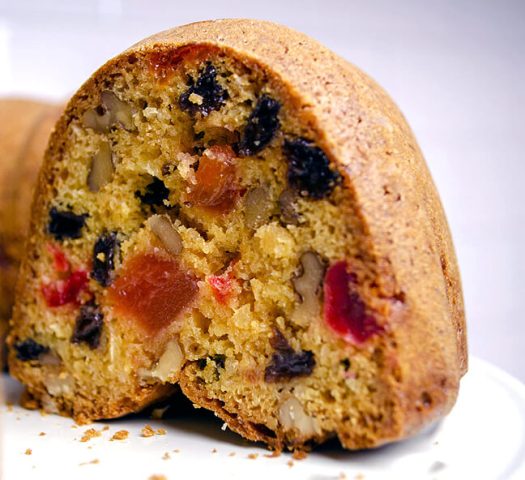Summer Vegetable Stew
The deli at our local grocery serves a wonderful vegetable soup that they discontinue for the summer, since “nobody eats soup when the weather is hot.”
Well, you know what? Yes, they do. We’ve enjoyed fresh vegetable soups for centuries in the South, and rightly so, since our gardens are the finest on the planet.
My recipe starts with two quarts diced canned tomatoes and juice. If you’re lucky, you’ll have a talented, industrious gardener who cans, and you will have their red gold in your larder. If not, Contadina will suffice. Sauté one large diced white onion with three or four diced ribs of celery and two cloves minced garlic in just enough vegetable oil to coat. Pour this into the tomato mix.To this add two cups water along with a cup or so of diced, rinsed okra; I like to add a little V-8.
Find something industrious or enlightening to do for a half-hour or until the onions and okra have surrendered to the mélange. This is a savory base for beautiful vegetable soups throughout the season. Fresh peas and beans, even green beans, should be parboiled until tender, but squash can be diced and added raw. I don’t use fresh corn at all, but that makes me an exception.
As to herbs, I’m frugal; a pinch of thyme and a smidgen of basil do just fine. Add salt and pepper with care. And yes, you can serve this warm or chilled.
Eudora’s Jitney
“Guess who I saw at the Jitney today?”
Depending on the compendium of time it could have been Eudora Welty, Willie Morris’ grandmother, Marie Hull, James Canizaro, Mrs. Fred Sullins, Mrs. R.E. Kennington, Betty Edwards, or my mother who shared the aisles with them all.
Since around 1930, Jitney Jungle 14 has been a fixture in Jackson, Mississippi’s Belhaven neighborhood, providing food, conviviality, and a hub of small town news to those who shared its aisles on Fortification. While the Jitney served the culinary needs of a diversity of incomes and interests it was the equal servant of all. The price of eggs was always the same for everyone. This article will be primarily about Jitney 14 but in the course of its journey we will learn a few things about its famous corporation, early Jackson and two of its foremost families. Settle back, pour yourself a cup of Jungle Queen Coffee and enjoy shopping the aisles of our history at the Jitney.
There could have been no “14” if there had not been a “1”. That “1” was born April 19, 1919, the dream of three young men whose fortunes lay ahead of them in the risk and rewards of yesterday’s America where a man could fail and rise again to prominence and success with God’s help and a good plan. Such was the destiny of Judson McCarty Holman, William Henry Holman and William Bonner McCarty, the fathers of the little store where you could “Save a nickel on a quarter.”
A Bit of Family History
W.B. McCarty and Jud and Henry Holman were cousins who first operated a store together in September 1912, on the southwest corner of Adelle and Grayson (N. Lamar) Streets in north Jackson. Each of the cousins put up a third of the start-up cost. This business had relocated from a block north at the corner of Grayson and McTyere Streets which was torn down to build houses for the McCarty sub-division. That store was operated by W.B. McCarty, Sr. and Jud Holman and A.N. Brannon worked for him. It was a cash and carry store and had initially been operated by W.B. McCarty’s father W.H. McCarty and located in the 1200 block of N. West Street near Millsaps. It was called Jackson Mercantile Company, the name given to it by Mr. W.H. McCarty, its founder.
W.H. McCarty had moved his family to Jackson in 1905 after operating the McCarty Store in Hemingway, Mississippi in Carroll County. Jud Holman came to Jackson in 1907 after working in the grocery business for Greenwood Grocery in Greenwood and began work with W.H. McCarty in his Jackson Mercantile Store along with Anthony N. Brannan. W.H. McCarty died in 1909. W.H. Holman came to Jackson in 1910 and worked for Mississippi Motors in Jackson, run by Joe Coffee McCarty, bother of Will McCarty, until Holman and McCarty joined together in Jackson Mercantile. When Will McCarty and Jud Holman opened the first Jitney Jungle #6 on East Capitol Street in April 1919, W.H. Holman was in France during the end of WWI. He returned to Jackson in June 1919 and helped his two cousins proceed to convert their other stores from credit to cash and carry and self service with the Jitney Jungle name since that first self service store was doing more business than all the other five McCarty/Holman stores combined.
Mr. W.B. McCarty attended law school at Ole Miss in the early Jitney days and returned to continue with the operation and growth of the stores with his Holman cousins. His legal acumen came in handy with an early patent infringement suit which the Jitney stores won. Mr. W.B. McCarty continued to franchise grocery stores in those days in addition to being heavily involved in the chain’s wholesale and retail operations. In his later years, Mr. McCarty would continue to go to his office checking on sales volume as well as the back storeroom doors to be sure they were always locked or attended. Never would a Jitney store manager or worker leave the back door open lest a theft might occur. The Junior Food Mart convenience store company, JFM, Inc. is still in business today and operated by H. Russell McCarty. It had its beginnings in the supermarket franchising that W.B. McCarty started and W.B. McCarty, Jr. continued until his death in 2001. (1) A railroad strike in 1916, left credit customers in such a bind the founders decided to quit the credit business. Business improved and a second store was opened on South Gallatin Street and the McCarty Holman Store chain rapidly grew to seven including stores in Greenwood and Canton. (2)
The First Jitney
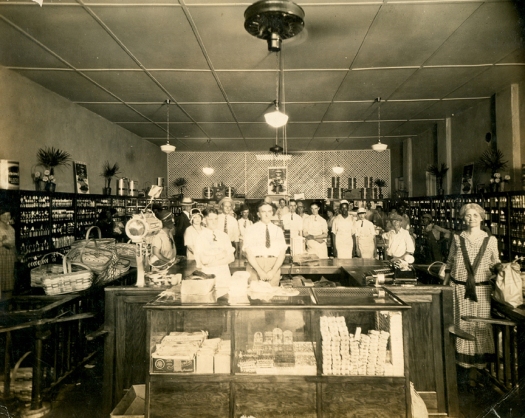
How did Jitney get its name? According to Mr. Will McCarty, at the end of the First World War, returning soldiers would buy an old car for riding about town. They called it a “jitney”. The term “jitney” was slang for a London taxi cab and became jargon in the states for a nickel, the cost for a downtown cab ride.
Back when the establishments were McCarty-Holman Stores, it was the habit of Chancellor V.J. Stricker, who lived just up Adelle Street, to invite the three young merchants, who were living in a nearby boarding house, to his home for Sunday dinner. Mrs. Josephine Bailey’s boarding house at 343 Adelle, could be a dark and foreboding place. Mr. Will relates there was only one light bulb in the entire house and tenants would “borrow” it and pass it around from room to room. One Sunday the boys told the judge they were considering a strictly cash and carry business which would save the customer 20¢ on the dollar over their deliveries. Cash and carry could thus save “a nickel on a quarter.” The merchants asked Judge Stricker to suggest a new name for their stores. Since a cab ride to town cost a nickel, the term “jitney” became popular and it was customary for patrons to shop with “nickels jingling in their pockets.” Judge Stricker suggested the name “Jitney Jingle” but McCarty made a variation when he observed that a wide variation of stock in the new stores would make the store itself “look like a jungle of values.” The name stuck. (1)(2)
1920’s-30’s
Throughout the 1920’s, the owners added a number of stores, each with its own numerical designation which changed over the years. According to the 1930 Jackson City Directory, Jitneys were listed as:
No. 1 – 400 E. Capitol
No. 2 – 1077 S. Gallatin
No. 3 – 121 W. Pearl
No. 4 – 2908 W. Capitol
No. 5 – 209 S. State
No. 6 – 423 E. Capitol (formerly No. 1)
No. 7 – N. State and Fondren Ave.
No. 8 – 412 W. Capitol
No. 9 – 719 N. Gallatin (later 1209 N. State)
No. 10 – 146 N. Farish
No. 11 – 167 E. Capitol
No. 12 – 850 W. Capitol
No. 13 – 1241 N. West
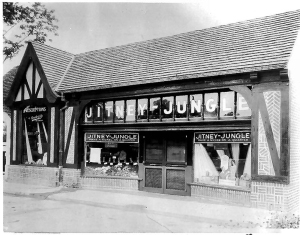

As the business grew, however, more space was needed to display groceries and in time the ladies area was discontinued. (5)(6) Mrs. Edwards grew up in the Belhaven area living first on State Street at Manship, where the new Baptist Hospital building is being constructed, then moving with her family to St. Ann. Later the family moved to the Council Circle area. In the early years of her marriage while still living in Belhaven, Mrs. Edwards and her husband would walk to the store and shop. Few had cars during the war. She would bring home the perishables and her husband would bring the other groceries when he came home from work. (6)
The formal grand opening of “The New Super Jitney-Jungle Store” took place on Friday, November 10, 1933, when according to articles in the Jackson Clarion-Ledger of that year, “Jacksonians gave a hearty welcome to the newest addition to stores of the city Friday and Saturday when thousands of persons visited the new Super Jitney-Jungle at the corner of East Fortification and North Jefferson streets.” (7) (8) Back then 14 was known to the neighborhood as the “Big Jitney” and No. 9 on North State, the “Little Jitney”. 14’s manager was Charles Alford who got his start at the first store in 1919.
Mr. Alford brooked no sloppy doings. Clerks were dressed down for failure to dress up. Ties were compulsory. Alford, however, did have a sense of humor as related in Henry Holman, Jr.’s publication “Save a Nickel on a Quarter”. According to Alford, the store butcher waited on a customer late one Saturday evening who had come in to buy a chicken. The butcher reached into his case and brought out his last chicken. He showed it to the lady but she wanted to see a larger one. He put the chicken back in the case, bent over, moved his arms about, rattled the ice a little – as if looking for the right sized one – and ceremoniously came up with the same chicken. The customer replied with a satisfied smile: ‘Yes, that one is just fine. I’ll take them both.’” Oops! (5)
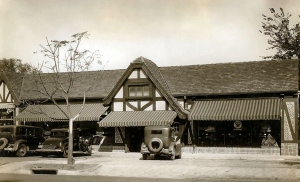
Its Tudor Revival style was designed by neighborhood architect Emmett Hull and contained only the grocery and the new Price Cain Drugstore at the Jefferson & Fortification corner. There was a small area for angular parking in front of the building and a loading dock and parking area around the corner on Jefferson. Belhaven was a rapidly growing neighborhood and shoppers came from throughout the area to see the new store which featured specialty items and select cuts of meat. (4)(9)
The Jitney chain had expanded rapidly throughout the “roaring twenties”, but by 1930, the Great Depression was beginning to take hold. On a typical Saturday you might drive your new $495, Ford coupe to the Jitney to shop. As you walked the aisles with your grocery basket you would notice green beans, three cans for 25¢; Wesson oil, 49¢ a quart; lemons, 12 for 20¢; cigarettes, 15¢ pack; roast beef, 19¢ lb.; bacon, 26¢ lb.; eggs, 25¢ dozen; lettuce, two heads for 15¢; sugar, 10 lbs. for 50¢; light bulbs, 20¢; fresh salmon, 29¢ lb.; mayonnaise, 29¢ pint; flour, 12 lbs. for 12¢; fryers, 35¢ lb.; Irish potatoes, 4 lb. bag, 55¢; and house coffee, 19¢ lb.
Most of these items you would carry home and place in your brand new $33.95 Ward’s refrigerator. (10) Refrigeration was just coming into play in the early 1930’s. Most people still had iceboxes. Meat was displayed in coolers on crushed ice and fresh fruits and vegetables, usually purchased from street vendors, went quickly early in the day. “Are the greens really fresh,” a housewife would keenly inquire of the store vendor in his white apron. “Yes ma’m,” he would respond. “Always.”
A trip to Jitney 14 was always a special event for the family shopper. An ad in the August 2, 1930 Clarion-Ledger announced “Your Jitney Jungle is arranged so that you can shop from front to back and from side to side without taking unnecessary steps. Your Jitney Jungle fixture arrangement not only provides a one-third more merchandise space than any other fixture plans in the world but is the most convenient. By shopping at Jitney Jungle you ‘save a nickel on a quarter’ on your grocery budget and many steps.” It was obvious these grocery stores were far ahead of their time. (11)
The 1940’s
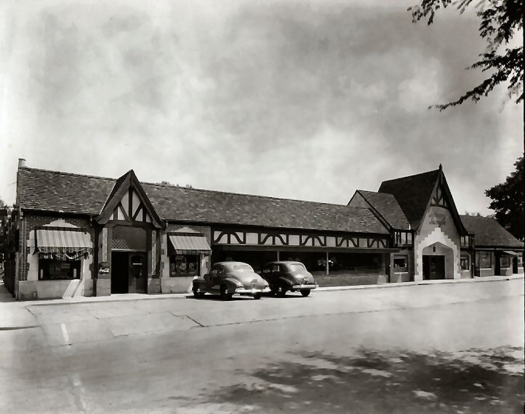
In 1941, Jitney Jungle 14 underwent its first expansion, enlarging eastward to include space for several small businesses. By 1942, the original grocery and adjacent drugstore had added the Beauty Lounge, Marjorie’s Shop (notions) and Snow White Cleaners. It took on the name English Village after its Tutor design. America was at war and throughout the early 1940’s, food items were scarce and rationed and neighbors pulled together and shared what they had. No one minded the sacrifice for their country and its sons overseas. On occasion there were vacancies in the store fronts and Mr. McCarty would let the Junior Red Cross use an empty space rent free to pack boxes to send to the Europeans after World War II. (4) (1)
Henry Holman, Jr. relates this story of an event at Jitney 14 during the days of food rationing. “On a certain April Fool Day, my father had one of the office force impersonate an O.P.A. investigator (rationing enforcer), who telephoned, of all people, the personable switch board operator at the store to find out why she had been getting extra sugar stamps. Since it was strawberry season, she impulsively implied it was to can strawberries – a fruit she and her family never ate! A few moments later father had the ‘investigator’ call back and say he was coming by her house that afternoon to check on her canning. Immediately she scrambled to the warehouse and bought a whole crate of strawberries, then came by to ask my straight-faced father for permission to rush home and can the fruit.” (5)

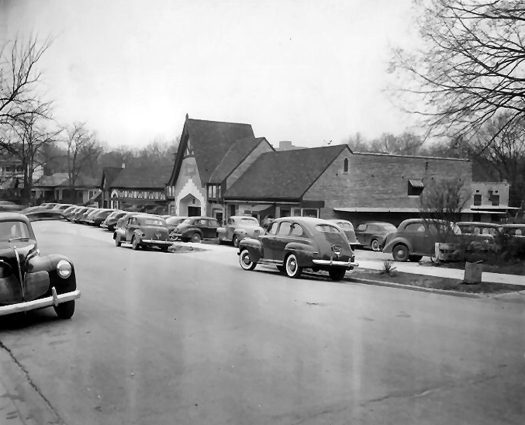
I learned to shop at Jitney 14. I used to swing on its wooden turnstiles when I didn’t weigh quite as much as I do now. I was sent down one aisle for a five cent box of salt and another for ten cents worth of baking soda. I learned the brand names of foods and how beef and poultry were weighed. I looked for cookies and ice cream cones at Cain’s and helped carry grocery bags to our neighbor’s car since we did not have one. Later on, when I was a bit older, us neighborhood kids hung out near the freight dock on Jefferson. Mr. Elliott and his staff would unload oranges and apples and lettuce and onions and throw the boxes, crates and sacks out the back door for trash pickup. The orange crates were the prize catch. Made of sturdy wood, they had a divider in the middle. We would grab a couple, take them home, stand them on end and connect them with a board. The consummate lemonade stand was born with a shelf on either side for the cash register and the lemons. Profits were spent on Hershey bars and milkshakes at the drugstore. Our mothers loved the apple crates which were used as storage boxes and ideal for new bedding plants in the spring. Of course the lemons, sugar, paper cups and straws all came from inside the store where the high lights and lesser lights came and went. All were on a mission of their own, delighting in the plethora of food and furnishings made available at war’s end. Grand times!
Us kids, however, were only familiar with the outside of the dock area. Mrs. Betty Edwards’ son Steve, who began as a bagboy at “14” knew it as an assistant store manager from the inside out. “The only unusual feature of Jitney 14,” he said, “was the tiny back room area. When the trucks came in, many of the cases of fast moving large items, such as toilet tissue or seasonal extra goods were sent by a conveyer belt to the dark cavern beneath. It was the most challenging storage room of any store in the company except the Jitney in Philadelphia, MS., regarding truck unloading, dock area and storage.” (12) Since all our readers know by now there is or was a ghost in most of Belhaven’s early digs, this one might have lived in the stock room.
Belhaven, from time to time, has been the haunts of several ghosts – most of them good. Rumor has it one lives in the water fountain at Laurel Street Park. One of these days we are going to have to look further into the adventures of these elusive creatures. Throughout the 1940’s and 50’s and into the 60’s, “the Jitney” was the neighborhood’s hub of commerce. And oh, the stories; some not always verified but all, of course, true.

She tipped the package boys a dime. We were making thirty cents an hour – so we fought over the ladies who tipped. Mrs. Fred Sullins and Mrs. Robert Kennington tipped a quarter! Sometimes Miss Welty did as well. “In the fall of 1951, I entered Vanderbilt University, where I graduated in 1955, and that fall in my freshman English class we read ‘Why I Live at the P.O.’ During the discussion that followed I raised my hand and said ‘I know Eudora Welty. I carried her packages at the grocery store at home.” And just to think, Miss Welty could have written “Why I shopped at Jitney 14”. (13) Perhaps someday a manuscript will be found!
Being a package boy was many a youngster’s first introduction into the business world. Both Henry Holman, Jr. and Bill McCarty, Jr. served in this capacity as they learned from the ground up the intricacies of their family business. Store manager Alford once said “All young men in Jackson should start out carrying packages for Jitney.” The Jitney Jungles back in the 1960’s published a little handbook which was given to all the newly hired boys. It began with a mission statement “The purpose of this manual is to show you in step by step fashion, what you should do to be successful in your Jitney Jungle job, and what the store needs and expects of you as one of its important employees.” (14)(5)
The manual goes on to outline instructions on neatness, promptness, making sensible decisions, care and packaging of the grocery product, courtesy and thoughtfulness and always leaving the customer with the comment “come back again and bring a friend.” It concludes “We welcome you into the organization. We hope you will like playing on the Jitney-Jungle team. The game is just beginning. We’d like to see you become a seasoned star – a veteran…you can – and will – if you do your best.” (14) What wonderful lessons for a 14-year-old boy to learn and practice. What good advice on which to enter the professional world.
Writer Willie Morris grew up in Yazoo City. He didn’t get down to Jackson often but many times when he did he visited his grandparents Mr. and Mrs. Percy Weaks who lived at 1017 N. Jefferson Street. The house left the tax rolls in 1968 and the home site has been a vacant lot since. A Tote-Sum Store once sat at the corner with Fortification with a loading area in the rear. Bill McCarty, III remembers as a child an artificial limb maker behind the Tote-Sum and several times going by with his dad at night and seeing prosthetic legs or arms reaching skyward from a pile outside. “That certainly terrified us!” Just north along the sidewalk a small, battle – scarred magnolia remains on which, according to Joanne Prichard Morris, Willie once carved his initials – but time has removed them. Willie Morris was familiar with Eudora’s Jitney. (1)(15)
Writing in his book “Homecomings” in the 1989 article A Return to Christmas Gone, the author tells of his purchase of a half dozen roses in Oxford and brought with him to the gravesites and former homes of his antecedents, the last of whom lived in Belhaven. “I retrace the Christmas journey – down Woodrow Wilson, right on North State Street past Millsaps, left on Fortification to Jefferson….My grandparents’ house is no longer there, long since a parking lot near the Jitney Jungle across the street. The magnolia is still in front, but where the house was is grim, bare asphalt, cold and wet now from the rain. ….Mamie and Percy, Maggie and Susie would be greeting us now, just beyond the magnolia where the front porch was. I close my eyes and hear their happy welcomes. Old Skip has raced beneath their feet into the house in search of turkey livers, and my great-aunts follow in their flowing black dresses.
“I stand in the parking lot where the parlor was. I feel the ripple of the lost voices. I drift back into the kitchen. Time, as one ages, is a continuum. Past and present consume themselves into the ashes. There is no good place for the last two roses. I put them on the asphalt where the dining room table was. Tomorrow someone will run over them in the parking lot. But who would disturb them today?” (16)
1960’s – 80’s
As the years approached the 1960’s, another expansion of English Village and Jitney 14 was underway. It was a massive undertaking of space increment and modernization. New businesses were Pridgens Florist, Collins Barber Shop, and the Beauty Lounge to accompany the older establishments. Cain’s had given way to Parkin’s. Other enterprises that have occupied English Village over the years included the Automatic Laundry Services (washeteria), Neal’s Barber Shop, Ben Franklin Hardware, Southern Pulmonary Clinic, the ABC Coin Laundry, the Village Inn & Pub and now Basil’s. (4) [Basil’s went out of business in early 2014, and a new restaurant, owned by Louis LaRose, is scheduled to open soon.jly] A new and enlarged parking lot was constructed to accommodate growing patronage. A major feature was a complete and enlarged bakery at the front of the store. The pungent odors of fresh bread, cookies, pies and cakes wafted through the store attracting shoppers like a magnet to the freshness and taste sensations of these delicacies.
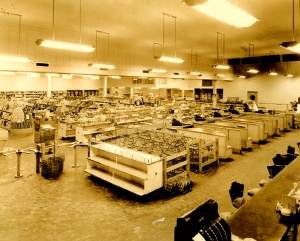
“One clear memory was the kitchen directly behind the former Fortification Street entrance where Mrs. Pitts, the deli manager, and the ladies who had cooked there for so many years used a gas burner as part of the stove to cook icings and other bakery items. I once tried to change her brand of flour but after being told that she only cooked with one brand, I went to buy that flour at the best price I could get since I knew I was not going to change her wonderful ways. Mrs. Pitts, who catered many a reception and social event with her great recipes, also had a hand in starting the development of the delicious pimento cheese still available for purchase in McDade’s deli.

“Extra thin sliced bread was so popular we spent hours preparing it on a noisy cast iron slicing machine that was in action every time I went into the kitchen. My personal favorite was the Old Fashioned bread in the wide loaf, one of six sandwich bread items baked in the Mill Street bakery. It came in a white bag with the logo printed on it and tasted much like real homemade. During the Christmas holidays we had red and green and other colors for each holiday that followed designed to compliment party sandwiches requested by our customers. You could just about tell the holiday by the color of the bread. In addition to governors, mayors, lawyers, legislators, doctors and everyone else in town, I vividly remember Eudora Welty coming by and talking with me as I stocked shelves or ran a checkout stand. Frank Haines (former Jackson Daily News entertainment editor) asked me when we were going to get a supply of George Washington Seasoning, so I ordered some for him. One item Jitney 14 always stocked was the small glass jar of Smithfield Deviled Ham spread. I learned to love it in 1972 and special ordered it for myself until it was recently discontinued by the distributor. I remember Mrs. Noone, an elderly lady from up around Madison Street with an Australian accent who came by every day to buy Ryvita Wafers for herself and a small bag of litter and a bit of liver for her 14-year-old cat. ‘The liver had to be tender,’ she told me, ‘or my cat will not eat it.’ On occasion she returned it the next day for more tenderization.
“I recall the Jefferson Street side entrance to Parkin’s Drugstore and going in to their soda fountain as a child where I either had a banana split or chocolate malt.” (1) How many young fellows in the Belhaven neighborhood running barefoot along the hot sidewalks of summer must have done the same.”
Jitney 14 was an icon, attracting patrons from throughout the Jackson metro area and beyond. The pace was quick, the new computerized checkout stands crowded and the clerks challenged with the need for speed and accuracy. One in particular caught the attention and love of many customers: Johanna Wade. Johanna, a native of Amsterdam, the Netherlands, was a 16-year veteran of Jitney 14 when she appeared in a local newspaper article. She was a popular favorite of Jitney shoppers and as the head checker knew many on a first name basis. “I know them by name,” she told the reporter. “I know their children. I like the people. I’ve got lots of friends here in the neighborhood. They’ve always been real good to me.” This goodness came through in 1986 when her husband died. They invited her over for the holidays to relieve her loneliness and they were happy to share their family day with her. When her parents died in 1988, and she made two trips to Holland in a week, customers expressed their sympathy by helping send her. “I came back and it was all in the office- money, checks, everything.” Then store manager Sam Holley called her not only an asset to the store “but to the entire neighborhood.” Such are the rewards of a friendly smile, accommodation and knowing the rhythms of Belhaven. (17)
The 90’s
Eudora’s Jitney rolled into the 90’s with a full head of steam. The company had expanded to hundreds of stores throughout the southeastern United States. Bill McCarty III reports that “business was brisk and by 1994 the Jitney-Jungle chain had expanded to 105 stores in six states and annual sales exceeded a billion dollars. That large volume continued to produce a profit for the company through hard work and efficiency.
“Beginning in 1987, the Jitney 14 structure was completely rebuilt from the inside out with the entire building being replaced except the exterior brick facades and walls along Fortification and Jefferson Streets and the north walls and east main entrance. This preserved the historic character of brick, tile and copper exterior with big improvements to the 30,000 square foot store. The store remained open during this period and the grand reopening was October 8, 1988. Parkins Drug Store was relocated to the structure occupied by Basil’s Restaurant today.” [See note above, jly](1)
The 21st Century
Times change; new generations take over and old ways are altered by current need and circumstance. The sale of the Jitney Jungle chain was finalized in March 1996 and at that time the annual sales volume was approximately $1.2 billion. After the sale, some difficult times followed with subsequent companies. However, Greg McDade purchased the old Jitney in 2005 just before it was to be closed forever and it flourishes today at the same location. Through the 84 years Jitney-Jungle was a McCarty-Holman enterprise it was state of the art as the store remains today. Its staff was courteous and well-trained, its stock and produce of the highest quality and its reputation a solid testament to what a family business can attain with vision, hard work and careful attention to the needs of its customers. Simply put, it did the right things at the right time in the right place.
Eighty-two years after the “Big Jitney” and Price Cain’s drug store first anchored the northeast corner of Jefferson and Fortification, McDade’s Market sits proudly on the site of Jackson’s very first air-conditioned supermarket. Our neighborhood owes a great debt of gratitude to the McDades for saving our store and making it viable. Road equipment churns down the new Fortification bustling with innovative ideas and the coming aesthetics resulting from countless hours of careful planning. Twenty-first century patrons pause along the aerated bins of fresh produce and the well-trained cashiers, stockers, sackers and department managers who hustle to fill their daily needs. The world is faster now but shoppers still pause to say “good morning” and “How are things?” And the employees say the same. It remains our neighborhood grocery.

As we shop McDade’s this Christmas season and gather together the spices and condiments of the year in anticipation of family reunited, we can reflect on Eudora’s tips to package boys and the spirit of Willie’s roses in the rain. Together they, as have we, been a part of the little store which became an exponent of the American dream as it brought its bounty to our dinner tables and conviviality to our lives. But remember also its journey. The early footsteps are stilled. The old hand-cranked adding machines have been replaced by computers. The aisles are brighter and bracketed with a plethora of universal foods, spices and specialty items. The turnstiles have given way to electronic doors. Roast beef costs a bit more than 35¢ a lb, but on sale days you can still save a nickel on a quarter. New writers and artists recreate its glorious past and its future shines like a freshly polished apple. But beneath it all, through the wooden and concrete floors clad in contemporary colors lies the ground that heard those footsteps in 1930 and above the main entrance, under the archway looking eastward into the sunrise, still stands a harbinger, a numeral that takes us from yesterday to tomorrow at Eudora’s Jitney: “14”.
Bill and Nan Harvey, December 2012

Nan Ertle Harvey is a native of Yazoo County, a graduate of Mississippi College and has lived with her husband Bill in the Belhaven neighborhood since 1994. She worked in a research position in the Department of Microbiology at UMMC, retiring in 2003. Nan’s hobbies are photography, nature study and family research. She is a volunteer at the Mississippi Department of Archives and History. Bill Harvey is a native Jacksonian, living most of his life in Belhaven. A MSU Bulldog, he has had careers in journalism, education and as development director of the Andrew Jackson Council, Boy Scouts of America. Bill enjoys photography, music, writing articles for neighborhood sources and sharing experiences with friends at a local coffee shop. (Text copyright Bill and Nan Harvey, used by permission of Bill and Nan Harvey; photos of Jitney Jungle copyright Bill McCarty III, used by permission of Bill McCarty III)
Sources:
(1) Conversations with Bill McCarty, III, Nov. 2012 [Details are from memory, family members and an April 3, 1962 interview between W.B. McCarty, Sr. and his son W.B. McCarty, Jr.]
(2) “Lesson Learned from Strike Here in 1916 was Start of Jitney-Jungle organization” [Jackson Daily News, Oct. 1, 1950]
(3) Jitney Jungle is Celebrating Start of 12th Year of Service [Clarion-Ledger, Oct. 12, 1930
(4) Jackson City Directory, 1930, 1916
(5) “Save a Nickel on a Quarter: The Story of the Jitney-Jungle Stores of America” [Address by William Henry Holman, Jr. to Newcomen Society in North America, Jackson, Mississippi, April 18, 1973]
(6) Interview with Betty McCarty Edwards [Madison, Mississippi; Nov. 12, 2012]
(7) Formal Jitney-Jungle 14 Grand Opening Invitation [Clarion-Ledger, November 10, 1933]
(8) “New Super Jitney-Jungle Has auspicious Opening” [Clarion-Ledger, Nov. 12, 1933]
(9) Registration Application/National Register of Historic Places/NPS – P. 74.
(10) “Store with a thousand Items” [Clarion Ledger, June 26, 1930]
(11) Store ad, [Jackson Clarion-Ledger, August 2, 1930]
(12) Conversation with Steve Edwards [Nov. 14, 2012]
(13) “Knowing Miss Welty: I was Miss Eudora’s Package Boy” – Coleman Lowery as told by his daughter Maggie [Lemuria Book Store blog, Aug. 9, 2012]
(14) A Handbook for Package Boys (1960)
(15) Conversation with Joanne Prichard Morris [October 31, 2012]
(16) Homecomings by Willie Morris (University Press of Mississippi, 1989)
(17) “Check Her Out” by Sherry Lucas [Clarion-Ledger, Feb. 7, 1994]
Special thanks to Mrs. Betty McCarty Edwards, Steve Edwards and particularly Bill McCarty, III who provided essential information and much-appreciated assistance. [This article was first published in 2014.]
Teddy Teacakes
For long afternoons when it’s too rainy to play outside, and the bears are hungry.
Cream 1 cup softened butter with 1 ½ cups sugar. Add a tablespoon vanilla extract and 3 lightly beaten eggs. Mix very well. Sift 3 cups all-purpose flour with a tablespoon of baking powder and a teaspoon of salt.
Using your favorite wooden spoon, mix flour with butter and eggs. Chill, roll out on a lightly-floured board, and cut into small rounds.
Bake on a lightly-oiled cookie sheet in a medium oven for somewhere round 10 minutes.
Three Bean Chili
Heat a quarter cup of corn oil in a deep skillet. Add a large, finely chopped onion, 3 minced cloves of garlic, 2 diced poblanos, and a four ounce can of diced green chilies. Stir until onions and peppers are soft, then pour into a saucepan on low heat along with a can of diced tomatoes and liquid.
Drain and add reserve liquid from (15-oz.) cans of red kidney, pinto, and black beans to simmering vegetables. Season with 2 tablespoons each of ground cumin, smoked paprika, chili powder, and a teaspoon of black pepper.
Keep on heat to meld, maybe 5 minutes, then add drained beans along with a teaspoon of oregano. Salt to taste, and stir gently to blend. Let this sit on low heat before serving with warm corn chips, pico de gallo, chopped cilantro, fresh avocado, onion, and jalapenos.
Stuffed Tomato Salad
Ladies of leisure assemble ostensibly for cards or tiles, but in fact for drinks, talking about who isn’t there and one who is.
Even the food is fussy: lavishly garnished congealed salad, trimmed sandwiches, and the obligatory stuffed tomato salad.
Slice the top quarter off a tomato, score the flesh and scoop it out; save for salsa. Drain rind and dust with salt and pepper. Stuff with chicken, shrimp, or tuna salad.
Cheese will run.
Friendship Cake
For the starter, combine a package of dry yeast with a cup of sugar and 2 cups of sliced peaches, and 2 cups water in a glass gallon jar. Cover loosely, set aside, and stir with a wooden spoon for ten days.
On the tenth day, add 2 12-oz. cans of chunk pineapple with liquid. Stir daily for 10 more days. On the 20th day, add 1 12-oz. can fruit cocktail with liquid. Let this work for 10 more days, stirring daily. On the 30th day, drain juice off, and set fruit aside. The liquid is your pass-along starter; give a pint to 6 friends along with the following recipe. You’ll have enough drained fruit for 2 Bundt or 9×13 pan cakes.
For a cake, add 1 pint of the starter to 1 cup nuts, chopped, 1 (18 ounce) yellow cake mix, 1 (3 1/2 ounce) package instant vanilla pudding, 4 eggs, and 2/3 cup oil. Mix well. Stir in 2 teaspoons cinnamon, chopped apples, raisins/cherries, and nuts. Bake in a greased and floured tube pan at 350 for about an hour.
Remove from the oven, cool, and heave a great sigh of relief.
South to America: Race, Black Nationalism, and Jackson, Mississippi
These selections from Imani Perry’s South to America (Ecco; January 25, 2022) join earlier excerpts from V.S. Naipaul’s A Turn in the South and Joan Didion’s South and West to exhibit how others from outside the American South perceive both the region in general and Mississippi in specifics.
Perry’s work echoes Naipaul’s in scope and form (in fact, she read A Turn in the South to prepare herself for the project), but her work is more perceptive, learned, certain, and above all determined.
Many will find South to America as provocative as it is ambitious. Perry maintains that race is “at the heart of the South, and at the heart of the nation,” and that “the country has leeched off the racialized exploitation of the South while also denying it.” These selections provide the reader with a radical perspective on the South, and most specifically on Jackson, Mississippi, which she says is “publicly, unapologetically Black.” While many will be surprised to hear Jackson’s Mayor Lumumba referred to as a “scion of Black nationalism,” it’s certainly nothing new.
I HEARD HIS VOICE OVER the PA in the airport and I wet my eyes. “I am Chokwe Antar Lumumba,” the mayor of Jackson welcomes you when you arrive.
He is one of a growing number of young Black Southern mayors, Mayor Lumumba, like my uncle Cornelius, went to Tuskegee for college and Texas Southern for law school. He was nurtured in the tradition of HBCUs. And he is a scion. Sons have a certain importance, culturally. Patriarchy, that fundamental structure of the West, was denied to Black people during slavery and has remained fragile ever since.
Money, protection, domestic authority–these are elusive, though cherished things in the face of poverty and prison. As much as I have written about escaping from patriarchy’s hold, I can’t pretend to not understand the deep yearning for a son to take on the leadership role of the father when it comes to Black people.
In Jackson the mayor’s father, the elder Chokwe Lumumba, had spent decades in the service of the freedom movement. The attorney for revolutionary Black activists of the Black Power movement like Assata Shakur and Nehanda Abiodun, he was also a leader of NAPO, the New Afrikan People’s Organization and notably carried a chosen surname that was the same as that of Patrice Lumumba, the Congolese anticolonialist movement leader who had been murdered in 1961 by Belgian and US forces.
NAPO was a coming together of different communities in the New Afrikan Independence Movement. The Republic of New Afrika was imagined in 1968 as an independent Black-majority nation in the Southeastern United States. The first vision was articulated at a meeting of the Malcolm X Society in Detroit. The states they imagined as being part of this new nation: Louisiana, Mississippi, Alabama, Georgia, and South Carolina. They shared goals of self-determination, landownership, and an independent nation-state for New Afrikans, who were colonized by US imperialism, in line with the older Black Belt theory. They believed in Democratic centralism, socialism, and reparations, as well as humility and self-defense.
The elder Lumumba was elected to the Jackson city council in 2009, and then to the office of mayor in 2013. He died under mysterious circumstances soon thereafter. The latter two events were national news, but I’d heard about the elder Lumumba repeatedly from my parents and their friends of his brilliance, courage, and commitment to the struggle” to “free the land.” And now here was the voice of his son, bearing a shared name, welcoming us to Jackson.
Jackson is urban, but it is also country. Naipaul referred to it as “the frontier” It was where he was introduced to the classic architecture of the Deep South “There were streets of ‘shotgun’ houses. It was the first time I had ever heard the expressive word: narrow wooden houses (like mobile homes or old-fashioned railway carriages) with the front room opening into the back room and with the front door and back door aligned.
On Sunday afternoon the people were out on the streets, so that the effect of crowd and slum and blackness was immediate: as though outdoor life, life outside the houses, was an aspect of poverty.” I wouldn’t call Jackson the frontier, but it might be something else: a sort of reverse metropole, a substation of the people.
The generations of freedom fighters in the Black Belt continue their work. And in Mississippi, they have made it the state with the most extensive Black political representation in America. It is the closest we have to a realization of full Black political citizenship. And it is the only state with a scion of Black nationalism as the executive of its capital.
Jackson is publicly, unapologetically Black, even for Mississippi. It evidences itself in culture as much as polities. For example, the marching band at Jackson State University is called the Sonic Boom of the South. When the male dancers jump, in navy and white so crisp it could not have possibly touched dirt or concrete for how pristine it is, they are suspended in air, time stands still, and yet the music goes hard and unceasingly.
When the women dancers dash a hip, to left, to right, it is sharp, taking back the lasciviousness teased in an instant, a taste before magisterial precision; as the horns gleam, the musicians are consistent as seasons of crops. They march, left right left right. The band does not make the flesh crawl; it revels in it. Love this flesh, it says. It makes sense that this is where the great chronicler of Black history in poem and fiction and prose Margaret Walker made her home as a professor at Jackson State University. She was one who saw the glory of the eternal coming of Black people. The exultation.
They march through the streets, not just in stadiums, and you can always see the dirt high-stepping underfoot. There is no easy resolution between beauty and terror, between poverty and abundance.
And just outside of the city, you find yourself looking around and saying the South would be worth holding close even if only for the trees. You can see it. How before all the building, the Piney Woods once stretched across five states. And as chopped down as they are now, their sharp warm scent and sight wraps around you even when you’re standing from a distance. They emanate fragrance that you feel in your eye sockets and above your socks. They are a fortification against climate change. The scientists say these trees are in a desperate battle against human green, slowing the pace of destruction by literally killing greenhouse gases with their scent, If only we were willing to reblanket the Southeast in conifers, we might save ourselves.
The interior rotunda in the seat of Mississippi government has a statue of the blind goddess Justice lit by over seven hundred lights. Around her are two Indigenous people, a European explorer, and a Confederate soldier. There is no African. Look up at the top of the gold leaf copper dome and see our national symbols a white-headed bald eagle.
We haven’t outrun or outlived the plantation, although it looks a little bit different. Now the fugitives are from Central America and the unfree laborers are in prison. Some kids are still hungry, even so many years after the breakfast programs and Head Start and all of the gains fought for by Black elected officials, because the gag is in the money and the land, and it still isn’t free.
There’s an honesty to Mississippi about all of this. The triumph is not in ends; it is in the fact that we are still here.
Peanut Hummus
Billy Dale was holding court.
“Yancy, this is very simple. If you grind dry roasted peanuts with grease and salt, you get peanut butter; if you puree boiled peanuts with oil, you get redneck hummus. Imagine me, a shit-kicker from Opelousas, having to teach Mississippi’s go-to bubba on white trash food the difference.”
“Billy Dale, I have never as long as I’ve drawn breath ever claimed to be an authority on anything, I’m just trying to find out as much as I can by cautious questioning.”
“You’re a pompous asshole, too,” Dale said. “My wife said you remind her of an alcoholic Sunday school teacher she had in Iuka. Used to make them draw pictures of him holding up a Bible.”
“B.D., let me off the hook, okay?”
“Fine,” Dale said. “Go turn the chicken and get me another beer.”
The Smug Alternative
Deena Boydd sipped a triple-cream latte and began her editorial for the next edition of The Jacktown Liberator.
“The worst problem in the world today is a false sense of self-importance,” she typed, considering it a brilliant beginning for a piece designed to skewer her detractors, a legion of local journalists, politicians and businessmen, not to mention creditors. While the journalists and politicians had other ridiculous axes to grind, her creditors, she reasoned, simply did not understand that she was a woman on a mission and that their concerns over money betrayed their petty sense of the world while confirming her broader and certainly more legitimate world-view.
A knock on the door of her tastefully neutral and largely barren office interrupted her reverie. Before she could say “come in” the door was opened by a short, very stout young black woman with a scowl on her face.
“Hello, Arusha, how are you this morning?” Deena asked, beaming with false goodwill.
“I been trying to get that man on the phone you told me about, but he ain’t takin’ any calls now,” Arusha said. “They said he got your message and he workin’ on a response.”
Deena frowned. Not only did she hope that the man Arusha was referring to, who happened to be the chairman of the city council, would respond to her questions by 5 p.m., her deadline to the printer, but she was also frustrated at trying to encourage Arusha to adopt a more sophisticated approach when it came to contacting people. Deena needed to speak with others simply in order to give the patina of reliability to her otherwise fabricated news stories about the inner workings of the city’s administration, but she felt that at the very least she should put a good face on her trumpery.
Deena clinched her teeth, which Arusha interpreted as a smile. Smiling in turn, Arusha asked, “Do you still want to go to lunch with me and Syllis at that foreign restaurant? She said it’s expensive. You know it’s my birthday that day, don’t you?”
“I thought you were a Virgo,” Deena said.
“Oh, I ain’t a Virgo. I got two kids. Anyway, I gotta go. It’s my turn to clean the bathroom, and Mr. Tadd’s picky about that. I thought he was going to have to be put in the hospital that time he found that cricket on the window. He sure is jumpy.”
Arusha left, slamming the door. Deena gritted her teeth hard even harder. Her gaze wandered from the door to the mirror on the wall opposite her desk.
‘I still look good,’ she said to herself. Deena was 53, a bottle blond with rapidly graying roots. She had begrudgingly decided to approve of her expanding bulk, which she reassuringly found in keeping for a mature woman of what she considered significant social stature. For a decade, her publication had ridden the modest wave of a small southern city’s liberal sentiments. Deena knew that her vision of the city’s future was the only one with any reason or design; she alone had her finger on the true pulse of the city. She felt that she’d established herself as a distinctive voice in local politics, when in actuality most people only picked up her publication in order to find out what bands were playing in the local nightspots.
Another knock at the door signaled the arrival of her partner, Tadd Stuffer, a pale, untidy man who stooped, snuffled and continually dusted his shoulders with dandruff. “We have to talk,” he said, glancing nervously down the hall before he closed the door.
“What is it this time?” Deena asked.
“Payday is this week,” he said. “And we don’t have enough money to pay everybody.”
“How much do we have?” Deena asked. Tadd quoted a figure. “Well, that’s enough for you and me, and enough to put out two more issues before another payday. We’ll issue everyone else vouchers.”
“We did that last time,” Tadd pointed out.
“In that case, you know what you have to do,” Deena said. “Call your mother and tell her we simply need a few thousand to see us through this rough spot.”
“Deena, I’m beginning to think Mommie’s patience is wearing thin with our continual need for money,” Tadd said. “She’s well-off, sure, but she’s already spent over a half a million dollars keeping us afloat for the past eight years. I don’t think she’s willing to do it for too much longer. Of course, it might help if you were a bit nicer to her.”
“Why should I be?” Deena thundered, her normally pallid, flaccid features mottled with fury. “She’s the one who made life miserable for you all those years, putting you in that clinic with all those other pathetic losers when all that was wrong with you was the need for the love of a strong woman. Look at all the good I’ve done for you. She should be grateful for that alone!”
“Deena, listen to me . . . “
“No, you listen to me! You get on the phone to that gold-plated bitch of a mother of yours and tell her that if she doesn’t send us twenty thousand bucks today, I’m going to tell her exactly what went on with her husband and your step-brother when he stayed in the pool house last summer.
“Deena, you promised!”
“I’m sorry, Tadd, but this newspaper is more important than your ugly family history. We are here in this city to help bring about a change, to bring a people out of bondage, to make good the wrongs of a century, and you’re worried about a measly case of incest?”
Deena was red in the face, her disproportionate Rubenesque body heaving with emotion. “Call her. Now!”
Tadd stared dumbly at her tits, which she had begun to knead provocatively. She started to unbutton her blouse. “Close the door,” she said.
“Here?” Tadd asked nervously.
“Yes.”
Tadd closed the door and whimpered while Deena drew a big black latex phallus from a bottom drawer.
***
In an office down the hall, Parsley Horton-Hoopey was giving her husband a lesson in political correctness.
“Zeus, I thought we’d agreed to call it ganja,” she said. “Marijuana is just a vulgarity invented by drug lords who only sell this sacred herb for money. And while we’re at it, it’s ‘maize’, not ‘corn’, for Demeter’s sake.”
Parsley had only recently moved to Jacktown from the West Coast, where she had lived in the commune near San Francisco her mother had founded in the mid-Sixties. She had moved to Jacktown to live with her grandmother after a series of arrests for larceny, fraud and drug charges had made it clear that the State of California teetered on the state of barbarism. Parsley had charmed Deena with her tale of persecution and woe. Deena, always the champion of those she perceived as underdogs, took her to her breast (quite literally and quite often, usually when Tadd was bound in handcuffs) and made her a managing editor, which meant that Parsley was in charge of the contributing writers, who were one by one becoming more and more frustrated and alienated because of her incompetence when faced with a paragraph and her indifference in dealing with deadlines.
In addition to her job at The Jacktown Liberator, Parsley also worked for a successful online marketing firm from which she had been pilfering funds in steadily increasing amounts for over six months. She reassured herself that if she got caught, she’d just get Zeus, who owned a small restaurant in the city’s trendy Fondue district, to pay them off and everything would be fine, and of course Deena would fight tooth and nail to keep her managing editor out of prison and avoid a scandal, wouldn’t she?
“And Zeus, don’t forget we have to go to Amelia’s house blessing Saturday afternoon.” Parsley listened on the phone then exploded. “I don’t care if you have to open the restaurant at 5! We’re going to Amelia’s! I’m supposed to hold the Holy Laurel Wreath! Besides . . . (she cooed) I have a surprise for you . . . Remember that black teddy you liked? . . . I bought it, and I’m wearing it to the ceremony.”
She hung up the phone with a sigh. God, she got tired of pushing sex, especially her own.







